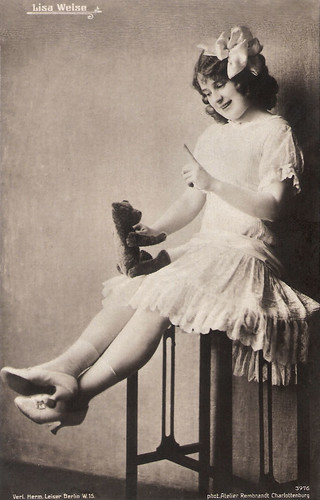In 1914 'Little Mary' Pickford became the most popular actress in America, if not the world. During the silent era, she was beloved for her beauty and charm. Even when she was an adult, Pickford often appeared on screen in young girl roles. In Europe many film stars followed in her footsteps. In the 1920s, the modern girl became boyish yet feminine - short hair, gawky limbs, a young flapper on the edge of sexuality, affectionately known in Germany as a 'Backfisch' (literally meaning fish to fry).
![Mary Pickford, Anna Pavlova]()
German postcard by Ross Verlag, Berlin, no. 1166/1, 1927-1928. Photo: United Artists.
Mary Pickford (1892-1972) was known as 'America’s sweetheart.' She was a founder of United Artists and helped to establish the Academy.
![Suzanne Grandais]()
Vintage postcard. Collection: Didier Hanson.
Suzanne Grandais (1893-1920) was the most beautiful and sophisticated actress of the French silent cinema. Her nickname was 'the French Mary Pickford' because of her angel face and blond hair.
![Asta Nielsen in Engelein]()
German small photo for the album by Dr. Oskar Kalbus, Vom Werden deutscher Filmkunst, Vol. I, Der Stummfilm (Cigaretten Bilderdienst, 1935). Asta Nielsen in Engelein (Urban Gad, 1914).
Danish silent film actress Asta Nielsen (1881-1972), was one of the most popular leading ladies of the 1910s and one of the first international film stars.
![Dorrit Weixler]()
German postcard by Verlag Hans Dursthoff, Berlin, no. 897. Photo: Karl Schenker, Berlin / Oliver Film.
German silent film actress Dorrit Weixler (1892-1916) anticipated such better known comedy stars of the German cinema as Ossi Oswalda and Anny Ondra. The career of the bright and light comedienne was like a candle burning on both sides.
![Ossi Oswalda]()
German postcard by Photochemie, Berlin, no. K. 286. Photo: Alard Walten, Berlin.
Ossi Oswalda (1895-1947) was one of the most popular comediennes of the German silent cinema.
![Blandine Ebinger]()
German postcard by Photochemie, Berlin, no. K. 1826. Photo: Alex Binder, Berlin.
Blandine Ebinger (1899-1993) was a German cabaret singer and actress. Her cinema career continued for seventy (70!) years.
![Eva May]()
German postcard by Ross Verlag, Berlin, no. 310/4 1919-1924. Photo: Becker & Maass.
Eva May (1902-1924) was the daughter of film star Mia May and producer Joe May. It was only natural that she would follow suit. She became ‘everybody’s darling’ but in 1924 she committed suicide.
![Lu L' Arronge]()
German postcard by Rotophot in the Film Sterne series, no. 225/1. Ca. 1919.
Little is known about Lu L'Arronge(1902-1991), who was a star of the German silent cinema, just after the First World War. The actress, who specialised in playing high-spirited teenagers, had her own production company with which she produced several films.
![Hedda Vernon]()
German postcard in the Film Sterne series by Becker & Maass, Berlin, no. 138/2. Photo: Eiko Film.
German actress, writer and producer Hedda Vernon (1866-?) appeared in more than 60 films of the early silent period. During the 1910s she was such a popular film star that she got her own Hedda Vernon serial.
![Lisa Weise]()
German postcard by Verlag Hermann Leiser, Berlin Wilm., no. 3976. Photo: Rembrandt, Charlottenburg.
German actress Lisa Weise (?-1952) starred in silent films of the 1910s. Most of her films were directed by Friedrich Zelnik and often her film partner was Karl Beckersachs.
![Hanni Weisse]()
German postcard by Ross Verlag, no. 3087/1, 1928-1929. Photo: Ernst Schneider, Berlin.
Hanni Weisse (1892-1967) belonged to the great film divas of the early German silent film. She was able to maintain her stardom till the late 1920s and then still could play temperamental teenagers.
![Truus van Aalten]()
German postcard by Ross Verlag, no. 3823/1, 1928-1929. Photo: Hegewald Film. Collection: Egbert Barten.
Dutch film star Truus van Aalten (1910-1999) made 29 films in the 1920s and 1930s, and only one of them in the Netherlands. She was a typical 'Backfisch' of the late Weimar cinema. Because of her informal acting and her humour, Truus's nickname in Germany became 'die kleine holländische Käse' (the Little Dutch Cheese).
This is a post for Postcard Friendship Friday, hosted by Beth at the The Best Hearts are Crunchy. You can visit her by clicking on the button below.
![]()

German postcard by Ross Verlag, Berlin, no. 1166/1, 1927-1928. Photo: United Artists.
Mary Pickford (1892-1972) was known as 'America’s sweetheart.' She was a founder of United Artists and helped to establish the Academy.

Vintage postcard. Collection: Didier Hanson.
Suzanne Grandais (1893-1920) was the most beautiful and sophisticated actress of the French silent cinema. Her nickname was 'the French Mary Pickford' because of her angel face and blond hair.

German small photo for the album by Dr. Oskar Kalbus, Vom Werden deutscher Filmkunst, Vol. I, Der Stummfilm (Cigaretten Bilderdienst, 1935). Asta Nielsen in Engelein (Urban Gad, 1914).
Danish silent film actress Asta Nielsen (1881-1972), was one of the most popular leading ladies of the 1910s and one of the first international film stars.

German postcard by Verlag Hans Dursthoff, Berlin, no. 897. Photo: Karl Schenker, Berlin / Oliver Film.
German silent film actress Dorrit Weixler (1892-1916) anticipated such better known comedy stars of the German cinema as Ossi Oswalda and Anny Ondra. The career of the bright and light comedienne was like a candle burning on both sides.

German postcard by Photochemie, Berlin, no. K. 286. Photo: Alard Walten, Berlin.
Ossi Oswalda (1895-1947) was one of the most popular comediennes of the German silent cinema.

German postcard by Photochemie, Berlin, no. K. 1826. Photo: Alex Binder, Berlin.
Blandine Ebinger (1899-1993) was a German cabaret singer and actress. Her cinema career continued for seventy (70!) years.

German postcard by Ross Verlag, Berlin, no. 310/4 1919-1924. Photo: Becker & Maass.
Eva May (1902-1924) was the daughter of film star Mia May and producer Joe May. It was only natural that she would follow suit. She became ‘everybody’s darling’ but in 1924 she committed suicide.

German postcard by Rotophot in the Film Sterne series, no. 225/1. Ca. 1919.
Little is known about Lu L'Arronge(1902-1991), who was a star of the German silent cinema, just after the First World War. The actress, who specialised in playing high-spirited teenagers, had her own production company with which she produced several films.

German postcard in the Film Sterne series by Becker & Maass, Berlin, no. 138/2. Photo: Eiko Film.
German actress, writer and producer Hedda Vernon (1866-?) appeared in more than 60 films of the early silent period. During the 1910s she was such a popular film star that she got her own Hedda Vernon serial.

German postcard by Verlag Hermann Leiser, Berlin Wilm., no. 3976. Photo: Rembrandt, Charlottenburg.
German actress Lisa Weise (?-1952) starred in silent films of the 1910s. Most of her films were directed by Friedrich Zelnik and often her film partner was Karl Beckersachs.

German postcard by Ross Verlag, no. 3087/1, 1928-1929. Photo: Ernst Schneider, Berlin.
Hanni Weisse (1892-1967) belonged to the great film divas of the early German silent film. She was able to maintain her stardom till the late 1920s and then still could play temperamental teenagers.

German postcard by Ross Verlag, no. 3823/1, 1928-1929. Photo: Hegewald Film. Collection: Egbert Barten.
Dutch film star Truus van Aalten (1910-1999) made 29 films in the 1920s and 1930s, and only one of them in the Netherlands. She was a typical 'Backfisch' of the late Weimar cinema. Because of her informal acting and her humour, Truus's nickname in Germany became 'die kleine holländische Käse' (the Little Dutch Cheese).
This is a post for Postcard Friendship Friday, hosted by Beth at the The Best Hearts are Crunchy. You can visit her by clicking on the button below.
